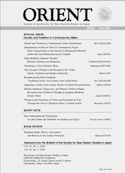Volume 56
Displaying 1-11 of 11 articles from this issue
- |<
- <
- 1
- >
- >|
SPECIAL ISSUE: Gender and Tradition in Contemporary Islam
-
Article type: research-article
2021 Volume 56 Pages 1-3
Published: March 31, 2021
Released on J-STAGE: April 09, 2024
Download PDF (427K) -
Article type: research-article
2021 Volume 56 Pages 5-24
Published: March 31, 2021
Released on J-STAGE: April 09, 2024
Download PDF (519K) -
Article type: research-article
2021 Volume 56 Pages 25-45
Published: March 31, 2021
Released on J-STAGE: April 09, 2024
Download PDF (510K) -
Article type: research-article
2021 Volume 56 Pages 47-67
Published: March 31, 2021
Released on J-STAGE: April 09, 2024
Download PDF (504K) -
Article type: research-article
2021 Volume 56 Pages 69-90
Published: March 31, 2021
Released on J-STAGE: April 09, 2024
Download PDF (530K) -
Article type: research-article
2021 Volume 56 Pages 91-105
Published: March 31, 2021
Released on J-STAGE: April 09, 2024
Download PDF (476K) -
Article type: research-article
2021 Volume 56 Pages 107-120
Published: March 31, 2021
Released on J-STAGE: April 09, 2024
Download PDF (486K) -
Article type: research-article
2021 Volume 56 Pages 121-140
Published: March 31, 2021
Released on J-STAGE: April 09, 2024
Download PDF (500K) -
Article type: research-article
2021 Volume 56 Pages 141-155
Published: March 31, 2021
Released on J-STAGE: April 09, 2024
Download PDF (488K)
SHORT NOTE
-
Article type: research-article
2021 Volume 56 Pages 157-163
Published: March 31, 2021
Released on J-STAGE: April 09, 2024
Download PDF (747K)
BOOK REVIEW
-
Article type: research-article
2021 Volume 56 Pages 165-168
Published: March 31, 2021
Released on J-STAGE: April 09, 2024
Download PDF (430K)
- |<
- <
- 1
- >
- >|
